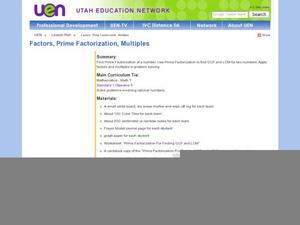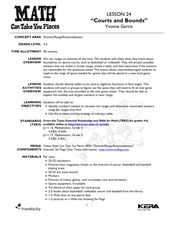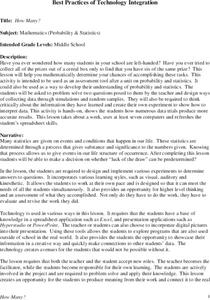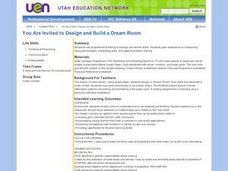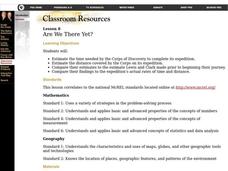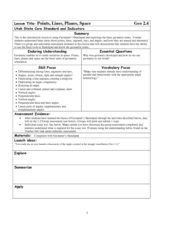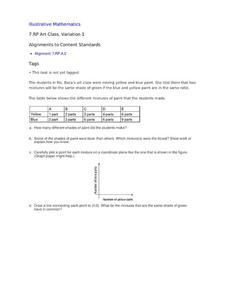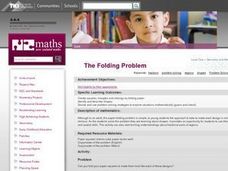Curated OER
Snowflake Curve
Students develop an appreciation for complex structures in nature. They observe patterns in nature in relationship to the Real World. Students use observation skills to assist in problem solving. They show comprehension of the concepts...
Curated OER
Factors, Prime Factorization, Multiples
Seventh graders examine Prime Factorizations, Multiples, and Factors. In this prime number, factorization, and multiples lesson plan, 7th graders identify greatest common factors and least common multiples. Students use problem solving...
Curated OER
Make Me Metric
Young scholars discover the need for standard units of measurement. They be engaged in estimation, problem solving, and use of measurement tools to begin an understanding of the metric system.
Alabama Learning Exchange
Number Clues
Students practice problem solving. In this number identification lesson plan, students practice identifying numbers based on clues or characteristics given. They also work in groups to identify the clues for given numbers.
Curated OER
Courts and Bounds
Students relate what they know about boundaries on sports courts to explore range of space. In this domain and range lesson, students identify numbers needed to calculate ranges and use the problem solving strategy of making a table.
Curated OER
How Much?
Fifth graders problem solve to determine if a fundraiser will be successful in the money raising activity. In this problem solving instructional activity, 5th graders read a book about fund raising and write down important vocabulary...
NASA
Lights on the International Space Station
Groups explore illumination with NASA's Lighting Environment Test Facility (LETF) as a context. Using the TI-Nspire app, groups determine the lux equation that models their simulation. They then use the lux equation to solve problems...
Curated OER
Waves, Sound, and Light
Ninth graders explain waves in terms of energy transfer and describe their basic types and characteristics. They solve mathematical problems involving wavelength and frequency. Students conduct experiments in reflection and refraction.
Curated OER
Working With Pattern Blocks
Fifth graders solve mathematical problems using manipulatives in this math lesson for the fifth grade classroom. Various activities are suggested for lesson implementation making this lesson highly adaptable to fit the needs of the...
Curated OER
How Many?
Middle schoolers explore and design ways to collect data through simulations and random samples. They perform two experiments to determine the answers to various probability problems, and present the data/graphs in the form of a...
Curated OER
Crossing the Oregon Trail
Students become familiar with the sacrifices that the migrants endured crossing the plains to the west. They experience some of the problem solving that the pioneers faced and pay the natural consequences of their choices.
Curated OER
You Are Invited to Design and Build a Dream Room
Seventh graders watch a video and enlarge and shrink scale by applying proportional thinking. They practice measuring, using percentages, computing area, and problem solving.
Curated OER
Are We There Yet?
Students estimate the time needed by the Corps of Discovery to complete its expedition. They problem solve and estimate the distance covered by the Corps on its expedition. They compare their findings to the expedition's actual rates...
Curated OER
How Deep is the Ocean
Students predict and then analyze the layout of the tectonic plates that form the ocean's floor using mapping skills and Inquiry based problem solving, They compare the depth of various regions in the ocean with the geologic age to...
Curated OER
Which is Closer to 1?
A seemingly simple question that reveals a lot about a student's understanding of fractions. In finding an answer, learners compare fractions with different denominators that are both greater and less than one. No number line is...
Missouri Department of Elementary
Acting Out Respect and Compromise
Puppets showcase the importance of being a good friend. Following a discussion about positive character traits, scholars create a paper-bag puppet and role-play scenarios with a peer.
Curated OER
Accurately Weighing Pennies II
Drawing from a scenario of the history of the penny, learners write and solve a system of linear equations from a context.
Teach Engineering
Designing Bridges
Introduces your class to the types of loads experienced by a bridge. Groups calculate the ultimate load combinations to determine the maximum load requirement. Using this information, builders then determine the amount of material they...
Curated OER
Points, Lines, Planes, and Space
In this points, lines, planes, and space worksheet, learners solve word problems dealing with points, lines, planes, and space. Students complete 20 individual problems and 20 group problems.
Willow Tree
Number Properties
The number of basic algebraic properties can become overwhelming for learners. A lesson explains and gives examples for all the basic algebraic properties. The resource is perfect to use as a way for pupils to organize and study the...
Curated OER
Art Class, Variation 1
Student statisticians calculate ratios to determine how many shades of green were mixed by Ms. Baca's art class. They graph the number of blue parts against the number of yellow parts for each combination and discover that some produce...
Teach Engineering
Microfluidic Devices and Flow Rate
When you have to flow, you have to flow. The lesson introduces class members to microfluidic devices and their uses in medicine. They watch a short video on how the diameter affects the rate of flow. The worksheet has individuals...
Illustrative Mathematics
What’s Missing?
Now you see them, now you don't! This fun peek-a-boo activity engages young mathematicians in developing their ability to compose and decompose numbers. After being presented with a series of counters, children close their eyes while the...
Curated OER
The Folding Problem
Ninth graders experiment with paper folding to create geometrical shapes. Students analyze the Copymaster of the problem. After the students have worked on their own for a while, stop them and discuss.



